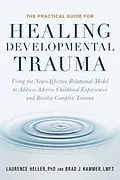A practical step-by-step guide and follow-up companion to Healing Developmental Trauma--presenting one of the first comprehensive models for addressing complex post-traumatic stress disorder (C-PTSD) The NeuroAffective Relational Model (NARM) is an integrated mind-body framework that focuses on relational, attachment, developmental, cultural, and intergenerational trauma. NARM helps clients resolve C-PTSD, recover from adverse childhood experiences (ACEs), and facilitate post-traumatic growth. Inspired by cutting-edge trauma-informed research on attachment, developmental psychology, and interpersonal neurobiology, The Practical Guide for Healing Developmental Trauma provides counselors, psychotherapists, psychologists, social workers, and trauma-sensitive helping professionals with the theoretical background and practical skills they need to help clients transform complex trauma. It explains:
Autorentext
Dr. LAURENCE HELLER is a somatic therapist who was in private practice for 40 years and currently teaches the NeuroAffective Relational Model (NARM) of therapy. Currently, he and 6 coteachers teach this method in 13 countries around the world. He cofounded Gestalt Institute of Denver. His books have been translated into more than a dozen languages.
BRAD KAMMER is a marriage and family therapist, professional clinical counselor, and somatic psychotherapist. He is also the training director at the NARM Training Institute. Kammer began his career as a humanitarian aid worker in Asia, which introduced him to personal and collective trauma. He has since based his teaching and therapy on the integration of somatic psychology, interpersonal neurobiology, and wisdom from spiritual traditions and traditional cultures. He has trained and consulted on trauma for clinicians and organizations internationally. Kammer lives with his family in a small town in Northern California where he has a private practice, teaches at several colleges, and regularly presents on trauma-informed care.
Klappentext
A practical step-by-step guide and follow-up companion
to Healing Developmental Trauma--presenting one of the first comprehensive models for addressing complex post-traumatic stress disorder (C-PTSD)
The NeuroAffective Relational Model (NARM) is an integrated mind-body framework that focuses on relational, attachment, developmental, cultural, and intergenerational trauma. NARM helps clients resolve C-PTSD, recover from adverse childhood experiences (ACEs), and facilitate post-traumatic growth.
Inspired by cutting-edge trauma-informed research on attachment, developmental psychology, and interpersonal neurobiology, The Practical Guide for Healing Developmental Trauma provides counselors, psychotherapists, psychologists, social workers, and trauma-sensitive helping professionals with the theoretical background and practical skills they need to help clients transform complex trauma. It explains:
• The four pillars of the NARM therapeutic model
• Cultural and transgenerational trauma
• Shock vs. developmental trauma
• How to effectively address ACEs and support relational health
• How to differentiate NARM from other approaches to trauma treatment
• NARM's organizing principles and how to integrate the program into your clinical practice
